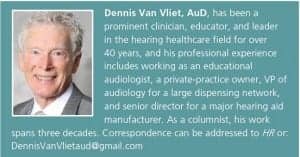Final Word | April 2018 Hearing Review
I really like avocados. Maybe it’s because I’ve never known any better. I grew up on an avocado orchard, learning how to pick the fruit, set it aside for ripening, and how to test them for ripeness. Just so you know: if the flesh yields to gentle pressure, it is ready to be enjoyed. (I know what some of you are thinking, don’t go there.) I can remember holidays where my mother would fill one of her huge pottery bowls with about two gallons of guacamole only to see it fully consumed by the extended family before we sat down to dinner. I never understood the “Avocado toast and millennials” meme —until I learned that they had to pay for it. It turns out that just about everyone in my family, including the babies, also love avocados. There is one exception, however. An otherwise normal, talented, late-20’s niece cannot stand them. Her husband does like them, but she shuns them completely. I can’t even offer them some of our extra fruit to take home. When I first learned about this aberration, I had a hard time accepting it.
“Why don’t you like them?” I asked. “Is it texture, or what?” It can’t be because of the taste. If you know avocados, you know that the flavor is delicate, and will accept pepper and salt and maybe a few herbs, but not much else or the essence is lost. (Guacamole is a different and heavenly thing but we don’t need to go into that in this narrative.) She never has been able to explain why she just doesn’t like them. Her sister, soon to be an audiologist by the way, is perfectly normal and loves avocados. I still have a hard time with the fact that this person is missing out on what avocados can offer, but I’m going to have to accept and adapt.
As these stories usually do, this situation reminded me of the work we do with people who have difficulty hearing. We have our own ideas about what treatment is good for people who need our help. It is based on what knowledge we have from professional training, and what we have learned from the experiences we have had with other patients for whom we have developed successful treatment plans. Success is a powerful motivator to repeat the steps we took to achieve that success. A problem arises if we don’t stop to think about the spectrum of individual differences that are out there in the tapestry of our patient population. Much of the time we can’t help but form immediate opinions by looking at an audiogram. We all do it, and, of course, audibility is an important factor in our decisions. However, in spite of what we have often heard, audibility is not everything. Hitting an audibility target on a difficult fitting may feel like a home run, but it may be a small part of the total effect we are trying to achieve. As we discover the important issues for each patient we see in our discussions with them, we cannot lose sight of their perspectives. Of course, the patient may need guidance to shape his or her expectations, but I think it is important for us to listen very carefully to the needs and preferences.
An active, smart 92-year-old with a moderate-to-severe hearing loss may want to keep things simple because he recognizes that he does not have the same capabilities as an early adopter of technology that he had 20 years ago. Yet he continues with service club meetings, poetry group meetings, and attendance at lectures where he complains that he cannot hear what he would like in these settings. A remote mic should help with the lectures, but not necessarily in a roundtable discussion at the service club or a poetry meeting. How should I proceed? I’m going to have to adapt to the fact that he wants to keep things simple. At the same time, I’m going to encourage him to adapt to using more of the technology available to him in his current hearing aids. My goals for the next visit are to verify that he is getting the audibility that he will need in the variety of settings he puts himself in. (Audibility isn’t everything, but it is difficult to move ahead without it.) Next, I’m going to slightly expand his memory choices in the programming, and review his seating strategies in these different settings. These changes will not solve all of his issues but may help enough to improve his quality of life.
The Final Word? Adaptation and acceptance are important concepts in our work. We as clinicians, along with our patients, need to accept the cards that we are dealt when we start to work on a solution. We need to accept the fact that what may be easy and successful for us with many patients, simply won’t work for others. Adopting personal rules such as “I don’t do CICs” as a blanket approach to the full spectrum of patients is an unnecessary restriction if we are to provide full service and meet the needs of all of the people seeking help from us. No matter how much we appreciate a certain product or approach, there will always be someone who doesn’t care for the guacamole we set out for them. Accept it, adapt, and look for a hummus recipe instead.
Citation for this article: Van Vliet D. Adapting treatment solutions to the individual. Hearing Review. 2018;25(4):50.
Image: © Juana María Gonzalez Santos | Dreamstime.com







Hearing industry insiders support adapting hearing aid technologies to the individual patient, but resist adapting to new technologies themselves. The reason is obvious; giving control to the patient threatens the traditional clinician’s business model.
Adapting to using an app to program hearing aids will be easier for the individual patient than the clinician.
It turns out that people really like having control of how their hearing aids adapt, regardless of whether the person that was their hearing aid provider has adapted to become their tele-hearing aid provider, or not.
• The SoundWear App allows the user to program inexpensive, HCEQ smart hearing aids in five bands
• Signia’s myHearing app allows wearers that want some professional help to connect with tele-clinicians over the phone from the comfort, and sound environment, of home
Enabling hearing impaired individuals to connect their hearing aids directly to an app on their smartphones changes everything.
For hearing aids and the hearing impaired, the changes stemming from direct-connect technology are a huge improvement. Streaming audio from a smartphone (or smartTV) directly into hearing aids beats earbuds, and opens a whole new realm of music appreciation and entertainment for hearing aid wearers.
The hearing healthcare provider that understands how the Internet changed the retail industry in the last decade has the best chance of adapting to the changes that smartphone apps bring to the individual patient and the hearing aid industry in the next decade.
All audiologist should heed this advice and come up with individualized treatment plans. Too often the result is always the same, regardless of patient needs. That is, the smallest hearing aid possible, preferably one with the most features a patient can afford. But we need to look at hearing aids as one of many solutions we have in our toolkit of solutions. The author alludes to a Remote Microphone, but questions if it will help in meetings. There are remote table top microphones specifically designed for meetings that are easy to use and extremely effective. But we should not stop there. Patients also need effective counseling as well. We need to move away from University trained hearing aid fitters, to true solution providers. And we need more outcome measures to determine if we are effectively meeting patient needs.